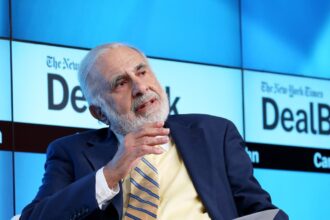Exxon Mobil Corp.’s plan to buy Pioneer Natural Resources Co. for $64.5 billion including debt ranks as the largest merger announced thus far in 2023, which has been a lackluster year for deal making.
The deal also stands out as Exxon’s second all-stock transaction this year, a rarer form of acquisition currency compared with the more widely used combination of cash and debt.
Exxon Mobil
XOM,
on Wednesday said it would buy Pioneer Natural Resources
PXD,
for about $59.5 billion in stock. The Wall Street Journal reported on the pending deal last week.
Exxon Mobil’s stock was down by 4.4%. Pioneer Natural Resources moved up by 0.9%.
Also read: Pioneer Natural, other Permian stocks rally on news an Exxon deal may be next
All-stock deals of this size remain relatively rare, but for Exxon Mobile, it makes sense, because the company’s share price has tripled in the past three years after posting a $22.4 billion loss for fiscal 2020, Victor Basta, chief executive of boutique investment bank DAI Magister, told MarketWatch.
“The cost of borrowing has multiplied while their stock price has gone up, so it makes sense for them to do an all-stock deal this big,” Basta said. “It’s relatively unusual, but given an uncertain macroeconomic environment, plus the volatility of commodity markets, there’s an incentive to conserve cash.”
Exxon reported cash reserves of $29.6 billion as of July 1.
Exxon also made an all-stock acquisition of Denbury Inc.
DEN,
for $4.9 billion in stock, a deal announced in July and expected to close by the end of this year.
Exxon Chief Executive Darren Woods said the company’s stock price, which has been boosted both by commodity prices as well as strategic initiatives, made it a good time to use stock as currency for the acquisition.
“Both Pioneer stock and our stock move with commodity cycles,” Woods said on a conference call with analysts about the deal. “As the commodity cycle rises, so does our stock. … Currency grows with the commodity cycle and declines as [the] commodity cycle comes off, and therefore we’ve got some insulation from that exposure.”
Exxon’s $59.5 billion purchase of Pioneer Natural Resources bumped Pfizer Inc.’s
PFE,
$44.6 billion acquisition of Seagen Inc.
SGEN,
announced on March 13, out of its spot as the largest of the year, according to data from KPMG.
Cisco Systems Inc.’s
CSCO,
acquisition of Splunk Inc.
SPLK,
for $31.86 billion, announced on Sept. 21, now ranks third.
That deal is followed by the $21.6 billion acquisition of Newcrest Mining Ltd.
NCMGY,
by Newmont Corp.
NEM,
and the $21.3 billion acquisition of WestRock Co.
WRK,
by Smurfit Kappa Group Plc.
SMFTF,
All told, U.S. mergers and acquisitions, or M&A, activity has totaled $1.12 trillion in deals in the first three quarters of 2023, down from $1.65 trillion for the first three quarters of 2022, according to KPMG.
In all of 2022, the M&A market generated $2.19 trillion in deals.
Phil Isom, global head of M&A at KPMG, said the third quarter of 2023 remained weak for deal making due to the threat of higher interest rates, in addition to a traditional summertime slowdown in the market.
“We did see an uptick in deals announced in September, and with the end of rate rises hopefully in sight we are seeing some green shoots in the M&A market,” he said in a prepared statement. “We are seeing a narrowing of the gap between seller and buyer valuation expectations and deals are being made for quality assets, although with the higher rates, private equity has been sitting on the sidelines, with corporate buyers taking the lead.”
M&A advisory work is an important revenue generator for big banks.
In the case of Exxon Mobil’s deal, Citibank
C,
was lead financial adviser, with Centerview Partners advising Exxon, while Goldman Sachs Group Inc.
GS,
Morgan Stanley
MS,
Petrie Partners and Bank of America Securities
BAC,
advised Pioneer.
Now read: Tech money is finally flowing again, and it may be just the beginning
Read the full article here










